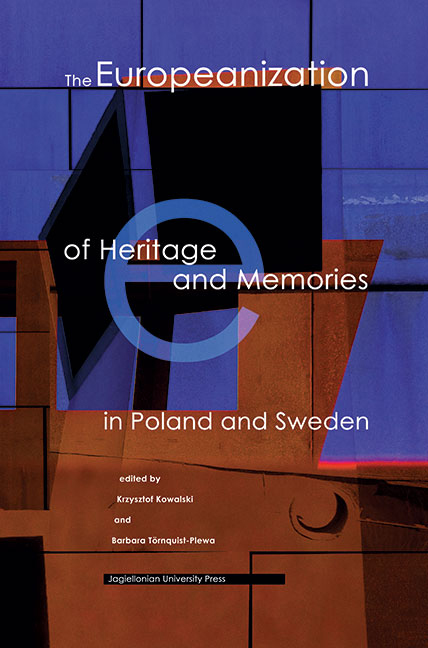Democratization and the Struggle for the Recognition of Memory and Heritage in the European Frame of Reference
from Conclusion
Published online by Cambridge University Press: 22 December 2017
Summary
The Europeanization of heritage and memories is one of the most central issues in the debate about European identity and transformation of collective identities in Europe. This volume presents a series of studies discussing various aspects of the processes of the development of memory, the dynamics of collective identity, and the construction of heritage in two European countries: Poland and Sweden. As the editors mentioned in their joint Preface to the volume, these two countries are different in many ways: Poland has a recent communist past, is relatively poor, predominantly Roman Catholic, and ethnically (or, in a more general sense, culturally) very homogenous. Sweden, in contrast, is wealthy, Protestant, and has developed over recent decades as a multicultural society. It has also been free from national, political and ideological domination by an external power. Today Poland and Sweden are both in the EU, but their status in Europe remains largely different. Sweden is one of the richest, most stable and predictable member states, while Poland not only remains the largest recipient of European funds, but also (especially in recent months) has a reputation of being a rather unpredictable partner in the EU, reluctant to identify with the core liberal values chosen by the EU as its axiological foundation. What is particularly important for the discussions in this volume is that Poland and Sweden had completely different experiences of the Second World War: Sweden was neutral while Poland was a victim of both Nazi and Soviet totalitarianism, and suffered more than most other European countries. On the other hand, as Barbara Törnquist- Plewa and Krzysztof Kowalski mentioned in their Preface to this volume, both Sweden and Poland “are located in the peripheries of Europe in terms of their relation to the historical and geographical heartland of European integration (France and Germany) and both of them became members of the EU relatively late.” In addition to this, one should perhaps mention that Sweden and Poland are on the margins of the EU integration process also in the sense that they prefer not to participate in some very central developments of European integration such as the Euro.
The main question asked by the authors of this volume is how the ongoing process of European political integration is influencing the local, regional, national and transnational interpretations of the past in these two countries.
- Type
- Chapter
- Information
- Publisher: Jagiellonian University PressPrint publication year: 2016



